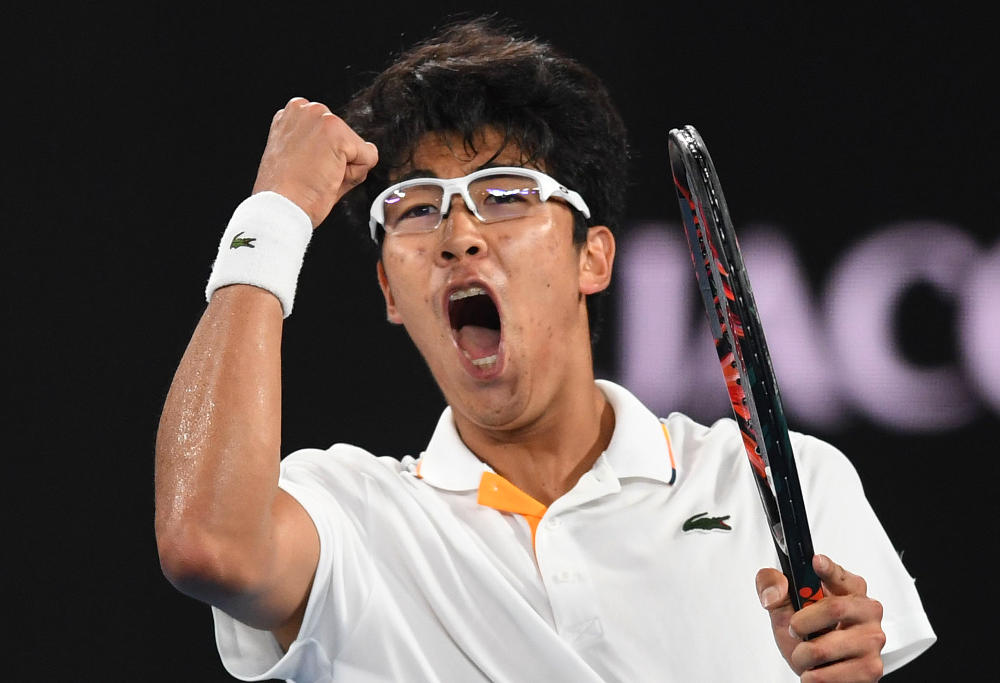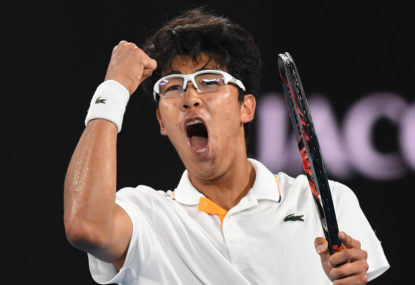At school, one of my closest friend’s surname was Chung. We were lucky to attend a multicultural school with a large number of Asian heritage students, but very regularly his surname was mispronounced.
He was of Malaysian-Chinese background, and – like anyone – insisted his name be said correctly.
It wasn’t a hard one to get right either. In his family, Chung is pronounced like the word ‘sung’ – definitely not with a long ‘oo’ sound, like the word ‘moo’.
There were no shortage of teachers, friends, and even other parents (my Dad in particular) on the pointy end of a spirited correction.
Flash forward a decade or two, to January 20, 2018. At the third round of the Australian Open, two young up-and-comers are playing a superb game of tennis.
But something is bothering me, to the point of exasperation. The commentators seem to be consistently mispronouncing Hyeon Chung’s surname, as ‘Choong’.
My immediate reaction is that Korean must have a different pronunciation to Chinese. The commentators are correctly pronouncing Zverev, so they must have done their homework. And to be completely honest, I’d never watched one of Chung’s games live on TV, and had never given any thought to the pronunciation of his name. My view of the pronunciation had been ingrained since early childhood, and was ripe to be challenged.
Nevertheless, I was irked enough to do some research. A quick google revealed that Chung, even in Korean, is definitely not pronounced ‘Choong’. Todd Woodbridge and Mark Fitzgerald were consistently mispronouncing his name.
A number of things struck me. How unprofessional! It is surely the sport’s commentator’s first job to learn the pronunciation of the player’s name – especially in tennis. I don’t expect everyone to have known a Chung growing up, but I would assume if you didn’t, you’d ask a few questions before getting into a commentary box.

(AAP Image/Lukas Coch)
Chung won the game in an outstanding performance. But come the fourth round, in perhaps the most important game of his career, he was again suffering the indignity of a mispronounced name.
Jim Courier seemed to get it – perhaps he had the concentration to observe the umpire’s correct pronunciation – but Lleyton Hewitt certainly didn’t, neither did Woodbridge, for the second game in a row.
Roger Rasheed chimed in, “I watched Chung all of last year.” But despite 12 months of close attention, even he can’t help but mispronounce his name.
It’s unprofessional. But there’s something else. It demonstrates the disconnect between Australia and tennis, which Channel Seven has exploited all tournament.
A common trope is that Australia takes a passing interest in tennis, enlivened once every twelve months when the Hopman Cup comes around, and placed into hibernation after the men’s final – only to be aroused by the occasional deep run by an Australian at another slam.
The Betoota Advocate regularly plays on this strange social phenomenon which suggests that for a country with such a rich sporting history, we don’t really care about tennis. It explains why we know (and care) little of Nick Kyrgios, or Bernard Tomic, or Samantha Stosur outside of their successes and failures in the Australian Open.
Channel Seven exploits this. Coverage of the Australian Open is regularly inaccurate, with part-time AFL commentators on the Channel Seven payroll playing tennis expert with cameos from some genuine former stars. It leads to commentary filled with, at best, inane cross-promotions, and at worst, complete garbage.
A prime example was one commentator’s insistence on describing Julien Benneteau’s second-round upset win over David Goffin as ‘the highlight of his career’. This despite the Frenchman’s appearance at a French Open quarter-final in 2006, not to mention a French Open doubles championship in 2014. Accuracy is forgone for the sensationalised story, as if to suggest Channel Seven is fighting for market share in the 24-hour tennis cycle.
Another commentator can’t wait to watch the Russian girls in My Kitchen Rules, which reminds us that there is absolutely no 24-hour tennis cycle, nor any competition for market share in Australian tennis broadcasting.
And back at the Chung game, all of the commentators can’t stop rolling out the same anecdote about how Chung started playing tennis to help his eyesight. This is a boring story at best, a weird stereotype at worst, and yet is said with a delivery which would make you believe playing tennis with glasses was a miraculous achievement. Martina Navratilova might have other thoughts.
Channel Seven gets away with it because it knows the Australian public are only superficially interested in tennis. Its poor coverage is not berated in the same way that Channel Nine’s middling Ashes coverage is, nor Channel Seven’s AFL coverage. If Australia’s tennis fans were anything like A-League fans, legions of twitter trolls would have driven Hamish McLachlan into hiding by now for his glorification of Maria Sharapova at the cringeworthy opening ceremony.
The tennis-watching public is as much to blame. I have long wondered, does Australia even really like tennis? We have the sensationalized, inaccurate coverage that suits a population who would prefer to regurgitate how much they hated Kyrgios versus Seppi in 2017 than watch a game in the flesh.
At least we can pronounce Kyrgios. We owe Chung the same courtesy.






























































































